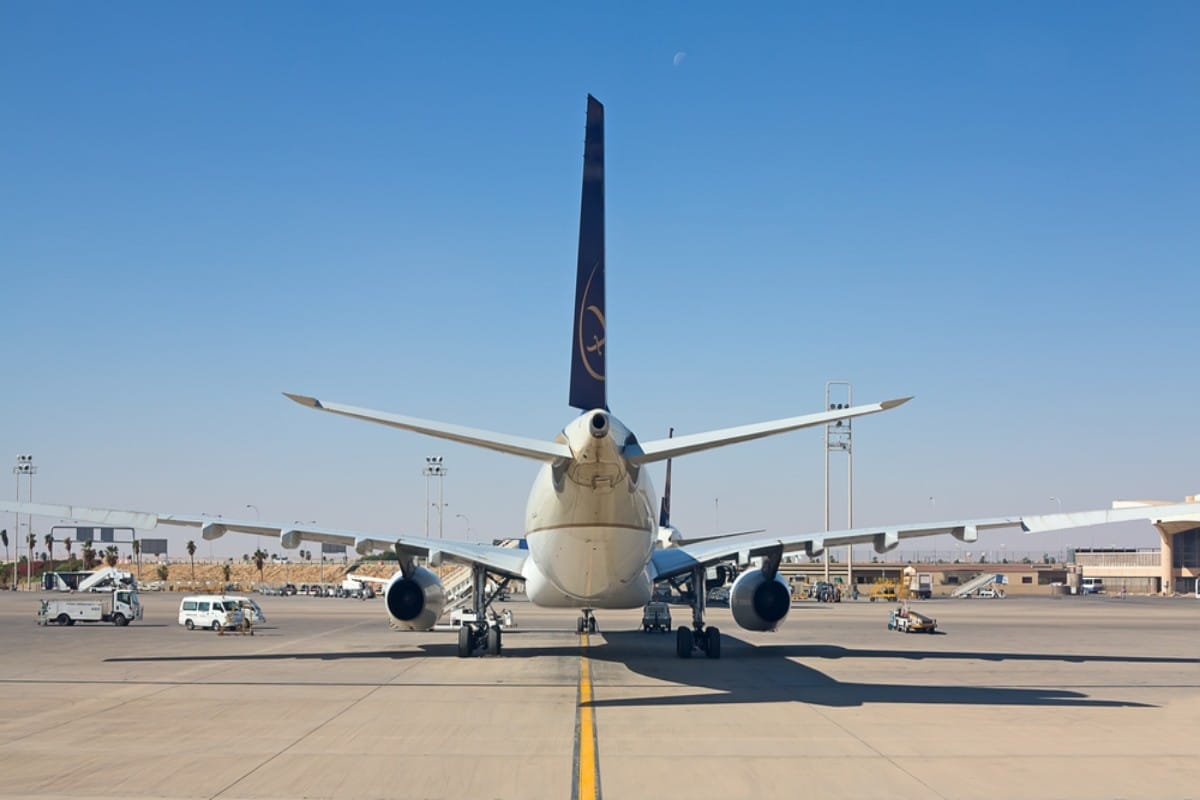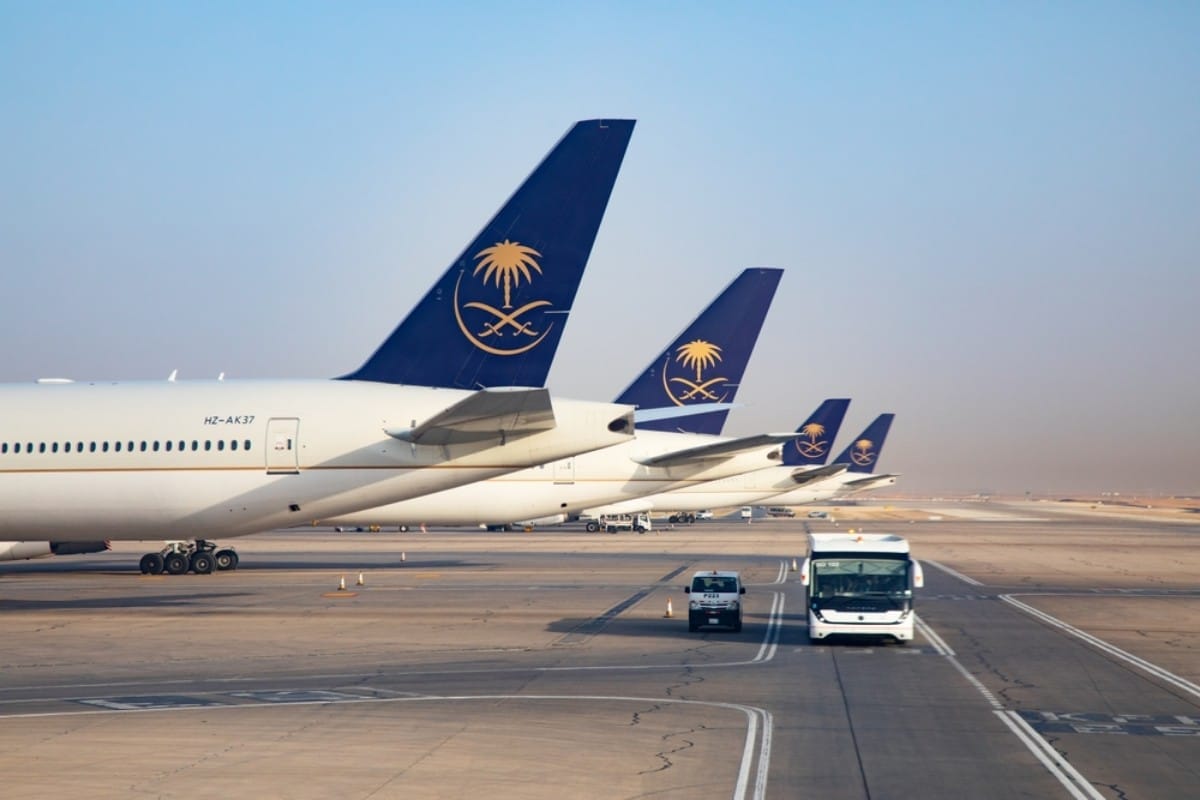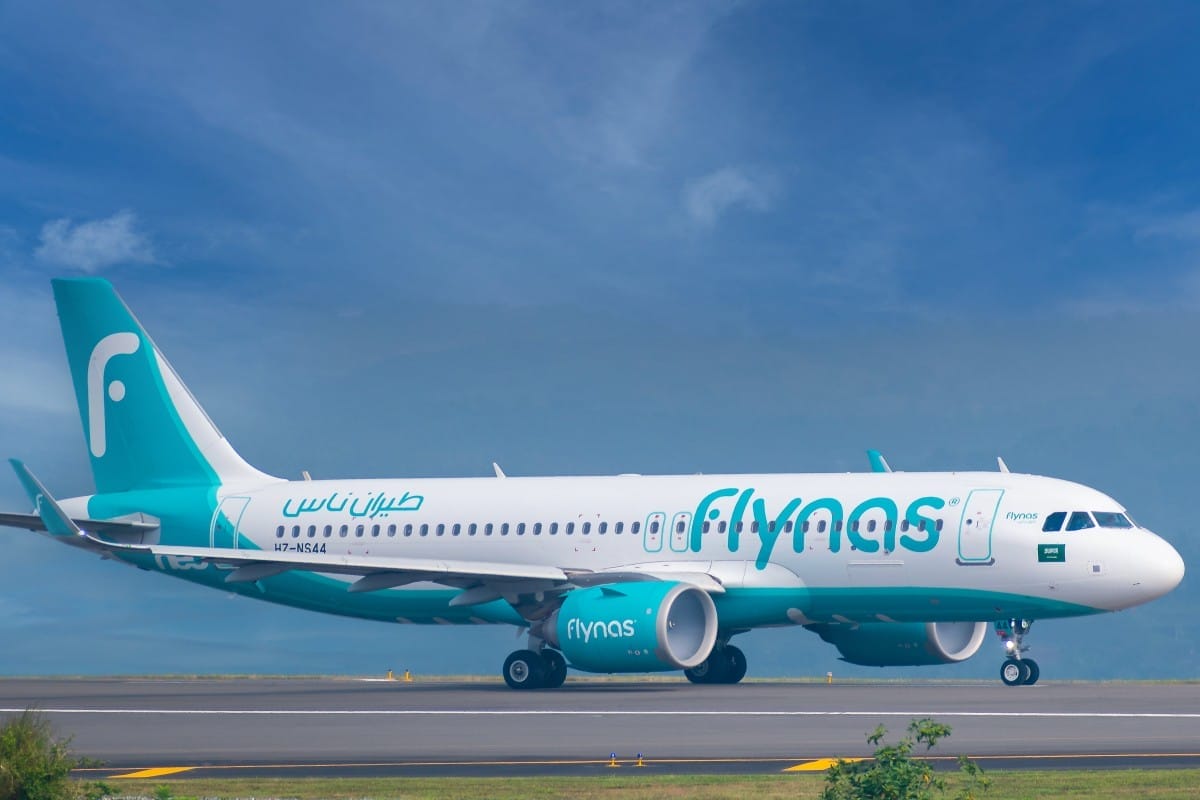Saudi Arabia’s aviation industry is experiencing substantial governmental backing as the country strives to achieve a leading position in this sector. The Kingdom aims to expand the market significantly and secure a presence of its airlines alongside major global carriers. This initiative aligns with Saudi’s broader goal of becoming an appealing hub for business and tourism, given the substantial investments these sectors generate for the state treasury. In fact, foreign investments in Saudi Arabia reached $33 billion in 2022, attracting over 70 international companies to establish their presence in the country.
National Aviation Transport and Logistics Strategy
In its efforts to develop the aviation sector, Saudi Arabia places great emphasis on sustainability and adhering to climate conservation standards. The country also assumes a prominent role in mitigating the risks associated with climate change. The establishment of the Ministry of Transport and Logistics Services in 1953, followed by the development of the General Authority of Civil Aviation (GACA), sparked interest in Saudi Arabia’s aviation sector. The National Transport and Logistics Strategy was subsequently introduced, aiming to foster the growth of the air transport sector and position the Kingdom as a key hub connecting three continents. With 29 airports and 149 international destinations, Saudi’s aviation sector facilitates significant international connectivity. Furthermore, it supports approximately 594,000 jobs, as stated on the Ministry’s website.
The National Transport and Logistics Strategy outlines several objectives for the air transport sector, including the enhancement of infrastructure and airport facilities. The goal is to increase cargo capacity to 4.5 million tons by 2030. Additionally, the aviation sector aims to accommodate 330 million passengers by 2030, expand the number of international routes utilizing Saudi Arabia’s airports, and increase airport capacity to accommodate more operators, targeting 30 million aprons per year. The strategy also seeks to enhance domestic and international connectivity by offering flights to over 250 destinations.
To fulfill the objectives outlined in the National Transport and Logistics Strategy, Saudi Arabia has implemented various measures. These include:
Expansion and construction of new airports
Building the world’s largest airport
Saudi Crown Prince Mohammed bin Salman has announced the master plan for King Salman International Airport, with expectations that the project will contribute approximately SAR27 billion ($7.2 billion) annually to the Kingdom’s non-oil economy.
The development of this new airport will bolster Riyadh’s position as a prominent global logistics hub, stimulating transportation, trade, and tourism. It will also serve as a vital link connecting the East and the West.
Furthermore, this project aligns with the Kingdom’s vision of transforming Riyadh into one of the world’s top 10 largest economies and supporting the city’s population growth, projected to reach 15-20 million by the year 2030.
King Salman International Airport is set to become one of the world’s largest, spanning approximately 57 square kilometers. It will feature six parallel runways, including existing terminals named after King Khalid. of Saudi Arabia.
Launch of a new national air carrier
In a bid to compete with transportation and travel hubs in the region, Saudi Crown Prince has made an official announcement regarding the establishment of a new national airline called Riyadh Air. Tony Douglas, a seasoned professional in the industry, has been appointed as the Chief Executive Officer (CEO) of the company, and chaired by Yasir Al-Rumayyan, the governor of the Public Investment Fund (PIF).
The capital city of Saudi Arabia, Riyadh, is expected to become a significant operational management hub, contributing $20 billion to the Kingdom’s non-oil GDP and generating over 200,000 direct and indirect jobs.
Capitalizing on its strategic location that connects three of the world’s most vital continents—Asia, Africa, and Europe— Riyadh Air aims to commence flights to more than 100 destinations worldwide by 2030, as outlined on the official Vision 2030 website.
Abha International Airport
Additionally, Saudi Crown Prince announced the master plan for the new international airport in Abha, located in the western part of Saudi Arabia. This initiative is a crucial part of the Crown Prince’s ambitious vision of achieving excellence and progress, as outlined in the “Qimam and Sheem” strategy and the National Aviation Strategy, which was launched in 2021.
The implementation of this new plan is expected to have a positive impact on the residents of the region, enhancing their quality of life. It will also play a significant role in promoting tourism, with the goal of attracting 10 million visitors from both domestic and international sources, aligning with the objectives of Saudi Vision 2030.
Al Wajh Airport revamp
Red Sea Global (RSG), renowned for its ambitious tourism ventures, has announced its latest project: the renovation of Al Wajh Airport. RSG has been entrusted with the responsibility of revamping the airport, which serves as a vital transportation hub.
The primary objective of this endeavor is to comprehensively modernize Al Wajh Airport, aligning it with international aviation standards. RSG plans to achieve this by upgrading the existing aviation terminal and infrastructure, as well as constructing a state-of-the-art international terminal.
The expansion of Al Wajh Airport will enable the introduction of a wide range of direct flights. This will significantly improve regional connectivity and generate new employment opportunities for the local population. RSG’s involvement in this project is set to play a pivotal role in transforming Al Wajh Airport into a modern and efficient travel hub.
First water airport
RSG has recently announced the successful acquisition of the operating license for Saudi Arabia’s inaugural water airport, which is situated in the picturesque Ummahat Islands within the Red Sea destination.
This achievement represents a significant milestone in the advancement of Saudi Arabia’s aviation sector and highlights RSG’s commitment to responsible development as it seeks to revolutionize the region’s tourism industry.
The water airport located in the Ummahat Islands offers an idyllic setting for exploring the marine environment from the air. With meticulous design, it ensures visitors enjoy a distinctive and seamless experience as they arrive at the Red Sea International Airport. Passengers will be treated to awe-inspiring views of the pristine Red Sea waters throughout their journey, enhancing the overall appeal of this remarkable destination.
First seaplane company
In addition, RSG recently introduced its latest venture, Fly Red Sea, which is the first seaplane company in Saudi. The company aims to provide transportation services to tourists, allowing them to travel across the beautiful Red Sea waters to renowned resorts like St. Regis Red Sea Resort and Ritz-Carlton Reserve.
Fly Red Sea currently operates a fleet of four luxurious Cessna Caravan 208 seaplanes, managed by a highly skilled aviation team. The company envisions expanding its fleet to include nine seaplanes by 2028, with further plans to exceed 20 seaplanes by 2030.
Development of new tourist destinations
Saudi Arabia and China
Saudi Arabia has been granted approved destination status (ADS) by China, as officially announced. The bilateral agreement, representing the Saudi Ministry of Tourism, permits Chinese citizens to embark on group tours to Saudi Arabia and facilitates their entry into the country.
Al-Soudah peaks
In line with PIF’s commitment to bolstering key sectors and supporting the development strategy for Asir’s Qimam and Sheem, the Saudi Crown Prince has embarked on an ambitious plan to create a new venture called “Soudah Peaks” in the breathtaking Soudah region. The primary goal is to establish a prestigious mountain tourism destination at an impressive elevation of 3,015 meters above sea level, situated on Saudi Arabia’s highest peak. The visionary project aims to showcase a luxurious and rejuvenating experience in mountain tourism.
SEVEN
The Kingdom has recently announced the fifth entertainment destination under the ownership of the Public Investment Fund’s Saudi Entertainment Ventures Company (SEVEN). With a noteworthy investment value of SAR1.3 billion, this project marks the first of its kind in the Asir region. It is deemed a pivotal endeavor that aims to transform the region into a challenging yet globally renowned destination that thrives year-round.
Aviation conferences
Riyadh recently played host to the Future of Aviation Forum, a remarkable event organized by GACA, which brought together experts and professionals in the aviation sector. The forum served as a valuable platform for sharing knowledge, exchanging ideas, and highlighting best practices to stay ahead of the rapid developments in the aviation market. This event represents a significant milestone in both the local and international civil aviation industry, with its outcomes including the noteworthy announcement of GACA’s initiative to standardize health requirements and policies. This initiative aims to support the sector’s recovery from the impact of the COVID-19 pandemic.
Read more: Riyadh Air: Global to local and back
Travel facilities
Pay in instalments
flynas, the prominent Saudi airline and economic carrier in the Middle East, recently announced a premium payment feature enabling passengers to conveniently pay for their bookings through monthly instalments facilitated by the issuing bank of their credit card. The initiative establishes flynas as the first airline in Saudi Arabia to extend such a payment option to its valued customers.
Reduction of airport fees
In a bid to enhance its competitiveness within a region boasting some of the world’s largest passenger hubs, Saudi Arabia has revealed its plans to implement a reduction of airport charges by up to 35 percent in 2022.
E-visas
In a recent announcement, flynas has revealed that air travelers who choose their airline will now have the convenience of applying for a transit visa through electronic platforms. The Transit Visa for Stop-over is designed exclusively for air travelers in transit and allows for a maximum stay of four days in Saudi Arabia. The initiative is in line with regulations set forth by the Ministry of Foreign Affairs.
Transportation of a greater number of pilgrims
Additionally, flynas has declared its ambitious plan to transport over 100,000 pilgrims across more than 13 countries during the upcoming 2023 pilgrimage season. This move will further contribute to the company’s track record of moving a total of over 2 million pilgrims and practitioners since its establishment in 2007.
Prominent global position
Best economic carrier
flynas, according to SkyTrax, the renowned global benchmark for measuring airline performance, has once again attained the prestigious distinction of being named the fourth-best economic airline in the world. This remarkable accomplishment also signifies flynas’ sixth consecutive year as the leading economic airline in the Middle East for 2023. This achievement was recognized at the esteemed Paris International Air Show, the largest exhibition in the aerospace industry, where major international airlines participated. Moreover, flynas has recently joined the United Nations Global Compact, highlighting its dedication to sustainable practices.
World Class Airline award
For the third year in a row, Saudi Arabian Airlines (SAUDIA) has been honored with the prestigious title of “World Class Airline” at the 2024 APEX Official Airlines Ratings. This remarkable achievement solidifies Saudi Arabia’s standing among the top seven global airlines recognized with the APEX “World Class Airline” award.
flynas joins the World Tourism Organization
Moreover, flynas has recently become an affiliate member of the United Nations World Tourism Organization (UNWTO). This milestone makes flynas the first Saudi airline in the Middle East to join the prestigious organization. This move is in line with flynas’ sustainability strategy and aligns with the Kingdom’s vision and dedication to shaping the future of the global travel industry.
With a deliberate and steadfast approach, Saudi Arabia is making remarkable strides in developing its aviation transport sector, setting its sights on attaining global leadership by 2030. The ambitious goal begs the question: Will the Kingdom successfully fulfil its aspirations and emerge as a true global leader in the aviation industry?
For more news on logistics, click here.







